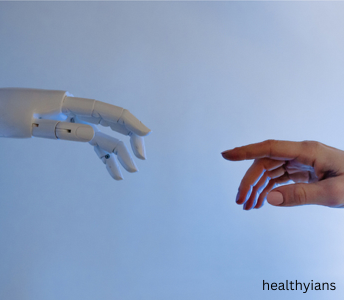Table of Contents
The Rise of AI in Telemedicine
Telemedicine has grown rapidly, allowing patients to speak with doctors from their homes. With advances in artificial intelligence, chatbots and virtual AI doctors are now assisting in medical care.
These AI-powered tools help patients get quick answers to health concerns, book appointments, and monitor chronic conditions. But can they replace human doctors? And how reliable are they?
This article looks at how chatbots and virtual AI doctors are shaping the future of telemedicine.
What Are Chatbots and Virtual AI Doctors?
Chatbots in Healthcare
Chatbots are computer programs designed to interact with patients using text or voice. They can:
-
Ask questions about symptoms
-
Provide possible causes of illness
-
Offer home care suggestions
-
Direct patients to medical professionals if needed
Virtual AI Doctors
Virtual AI doctors are advanced systems that use machine learning and medical databases to:
-
Analyze symptoms in detail
-
Recommend treatment plans
-
Monitor patients with long-term conditions
-
Assist doctors in making medical decisions
Unlike chatbots, virtual AI doctors can process medical data and provide more in-depth support.
How AI Chatbots Assist in Healthcare
AI chatbots play a growing role in patient care. Some of their common uses include:
-
Symptom Checking – AI chatbots ask questions about symptoms and suggest possible conditions.
-
Appointment Scheduling – They help patients find available doctors and book visits.
-
Medication Reminders – Patients receive alerts to take their medicines on time.
-
Post-Treatment Follow-Ups – AI tools check how patients are recovering after treatments.
-
Mental Health Support – AI chatbots offer basic emotional support and guidance for stress or anxiety.
These chatbots save time for both patients and healthcare providers by handling simple queries.
Virtual AI Doctors: Can They Replace Human Doctors?
While AI doctors are improving, they cannot replace human doctors completely. AI can:
✔ Analyze large amounts of patient data quickly
✔ Help identify early signs of diseases
✔ Assist in diagnosing common conditions
However, AI still has limitations:
⚠ It lacks human judgment – Doctors consider emotions, lifestyle, and personal history when diagnosing.
⚠ It may misinterpret complex symptoms – AI works best for common conditions but struggles with rare diseases.
⚠ It cannot perform physical exams – Many diagnoses require hands-on evaluation.
AI can support doctors but not replace their expertise.
Benefits of AI-Powered Healthcare Chatbots
There are several advantages to using AI chatbots in telemedicine:
✔ 24/7 Availability – Patients can get answers at any time without waiting for a doctor.
✔ Faster Responses – AI provides instant advice, reducing delays in care.
✔ Cost-Effective – Virtual AI doctors help lower healthcare costs by reducing unnecessary visits.
✔ Improved Access to Care – People in remote areas can receive basic medical support without traveling.
✔ Reduces Workload for Doctors – AI handles routine tasks, allowing doctors to focus on serious cases.
Challenges and Limitations of AI in Telemedicine
Despite its benefits, AI-powered healthcare still faces some challenges:
⚠ Accuracy Concerns – AI is only as good as the data it has. Mistakes can happen if the system is not trained well.
⚠ Patient Trust – Many people are still hesitant to rely on AI for medical advice.
⚠ Data Security Risks – AI systems collect sensitive health information, which must be protected from cyber threats.
⚠ Lack of Emotional Understanding – AI can recognize symptoms but does not provide the human empathy that patients need.
Addressing these challenges will help AI become a more reliable tool in healthcare.
The Future of Chatbots and Virtual AI Doctors
AI chatbots and virtual doctors are expected to improve further in the coming years. Future developments may include:
✔ More Advanced Diagnosis Tools – AI will detect diseases earlier and with better accuracy.
✔ Integration with Wearable Devices – Smartwatches and health trackers will connect with AI to monitor patient health.
✔ Improved Mental Health Support – AI systems will provide more personalized therapy sessions.
✔ AI-Assisted Emergency Response – Chatbots will guide users on first aid in critical situations.
As AI technology develops, it will continue to support doctors and improve access to healthcare worldwide.
FAQs About AI in Telemedicine
Can chatbots replace human doctors?
No, chatbots provide basic support but cannot fully replace human doctors. They are best used as a first step before consulting a medical professional.
How accurate are AI virtual doctors?
AI doctors can provide reliable information for common illnesses but may not be accurate for rare conditions. Human doctors should always review AI-based recommendations.
Are AI chatbots safe for medical advice?
Yes, but they should be used for general guidance only. Always consult a doctor for serious health concerns.
Do AI chatbots store patient data?
Many chatbots store medical data for analysis, but privacy policies vary. Patients should check how their data is used before sharing personal health information.
What are the best uses of AI in telemedicine?
AI is best for symptom checking, appointment scheduling, medication reminders, and general health advice.
Conclusion
Chatbots and virtual AI doctors are changing how healthcare is delivered. They provide fast, accessible, and cost-effective support, helping both patients and medical professionals.
While they cannot replace human doctors, they serve as useful tools for managing basic health concerns, guiding patients, and improving telemedicine services.
As technology improves, AI-powered healthcare will continue to grow, making medical assistance more available to people worldwide.






